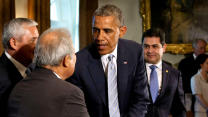Obama Is Preparing To Make One Of The Boldest Moves Of His Presidency — And It Could Stretch The Scope Of Executive Power
AP
By the end of the summer, President Barack Obama will make what some activists and legal experts say could be the "boldest move" of his presidency as he prepares to move without Congress on immigration reform.
The coming executive actions to change immigration policy could become the defining moment in a second term marred by congressional gridlock. A mid fierce debate over the crisis along the U.S.-Mexico border they also could set up a potential political firestorm just weeks before the crucial midterm elections. Perhaps most importantly, Obama's coming executive actions could also test the limits of presidential power.
"Depending on how far they go, yes," David Martin, a professor at the University of Virginia School of Law who specializes in immigration law, told Business Insider. "It could be a significant challenge to the scope of presidential power."
The White House has provided few hints on what Obama will do on immigration as a review by the Departments of Justice and Homeland Security on his options is still ongoing. The Washington Post has reported, based on readouts of meetings among White House officials, congressional Democrats, and activist groups, that Obama could effectively expand the Deferred Actions for Childhood Arrivals program. DACA, as it is known, has shielded hundreds of thousands of young undocumented immigrants brought to the U.S. as children from deportation .
According to the Washington Post report, the Obama administration is considering providing " temporary relief for law-abiding undocumented immigrants who are closely related to U.S. citizens or those who have lived in the country a certain number of years." The number of people who could fit under those descriptions might be as high as five million.
"We're asking the president to really go as broad as he can go," Cristina Jimenez, the cofounder and managing director of the group United We Dream, told Business Insider, adding: "He has a chance to make one of the boldest moves he possibly could. It depends on how he wants to be remembered."
United We Dream was one of a few groups that gave up rather early on the idea Congress would pass any sort of legislative reform to the nation's immigration policy. The group stopped lobbying Congress on the issue long before House Speaker John Boehner informed Obama in late June that the House would not take up any immigration-related legislation this year.
Jimenez said United We Dream then made Obama its "primary target," because he has the authority to enforce the law. As most proponents of immigration reform see it, Obama's options for executive actions fit into two categories, as laid out earlier this year by the left-leaning Center for American Progress:
- "Enforcement reforms" — in which, for example, the administration would choose to place a lower priority on undocumented immigrants who do not have a criminal history or who have extensive community ties.
- "Affirmative relief" — involves identifying the low-priority individuals and creating a program for them to earn relief from deportation, such as in the case of the DACA program.
During a news conference last week, Obama painted a sharp contrast between himself and congressional Republicans who voted to effectively end the DACA program the same day, saying he would have to "act alone" to solve the border crisis.
"The broader point is that if, in fact, House Republicans are concerned about me acting independently of Congress — despite the fact that I’ve taken fewer executive actions than my Republican predecessor or my Democratic predecessor before that, or the Republican predecessor before that — then the easiest way to solve it is passing legislation. Get things done," Obama said.
Some legal experts, as well as supporters of any potential executive action, think the administration is on solid legal ground to take the steps described in reports — despite the White House's repeated claims earlier this year that its hands were tied.
Others, like Mark Krikorian, the executive director of the conservative-leaning Center for Immigration Studies, disagree. Krikorian argued that though much smaller versions of the DACA program have been pursued by presidents in the past, they were usually in emergency situations in which the president did not have time to wait for Congress.
Krikorian said an expansion of the DACA program to as many as five million people could constitute a fundamental change in executive power — from a constitutional system with checks and balances to one that could run on "decree."
"He doesn't give a rat's ass about the Constitution," Krikorian said of Obama.
Krikorian said Obama's executive actions could be a slippery slope for future presidents. One example he gave: A Republican President Chris Christie, for instance, could want to reform the corporate tax code. Facing opposition from Congress, he would decide that his administration would simply not prosecute corporations that don't pay more than 25% in taxes.
However, Ben Winograd, an attorney at the Immigrant and Refugee Appellate Center, rejected Krikorian's analogy. Winograd told Business Insider the federal government always has the discretion to enforce the law as it wishes or sees capable — and does so already, to an extent, in deciding which types of violators of tax laws it wants to go after.
REUTERS/Jason Reed
"If the complaint is that, 'Well, so and so isn't following the law as we'd like him to,' then the only remedy for that is political," Winograd said. "You can vote them out at the ballot box, or you can try to bring articles of impeachment. But to say you are violating the law by not enforcing the law to an extent we'd like — I mean, it's a non sequitur. It doesn't make sense."
The key element the administration must follow is adhering to the resources allocated by Congress. The Impoundment Control Act requires the executive branch to spend the money appropriated by Congress toward the purpose designated by Congress.
Congress has appropriated enough funds to deport about 400,000 people a year. The administration deported nearly 370,000 undocumented immigrants last year, according to statistics released by the Department of Homeland Security.
Martin, the Virginia law professor, told Business Insider the administration could theoretically adhere to those guidelines for at least a few years while expanding deferred action. But absent legislative action from Congress, it might be hard to continue on a long-term basis.
"The situation requires f aithful execution of appropriation laws," Martin said. " If they drop far below that, then there'd be real legal issues."











No comments:
Post a Comment
Thanks for commenting. Your comments are needed for helping to improve the discussion.